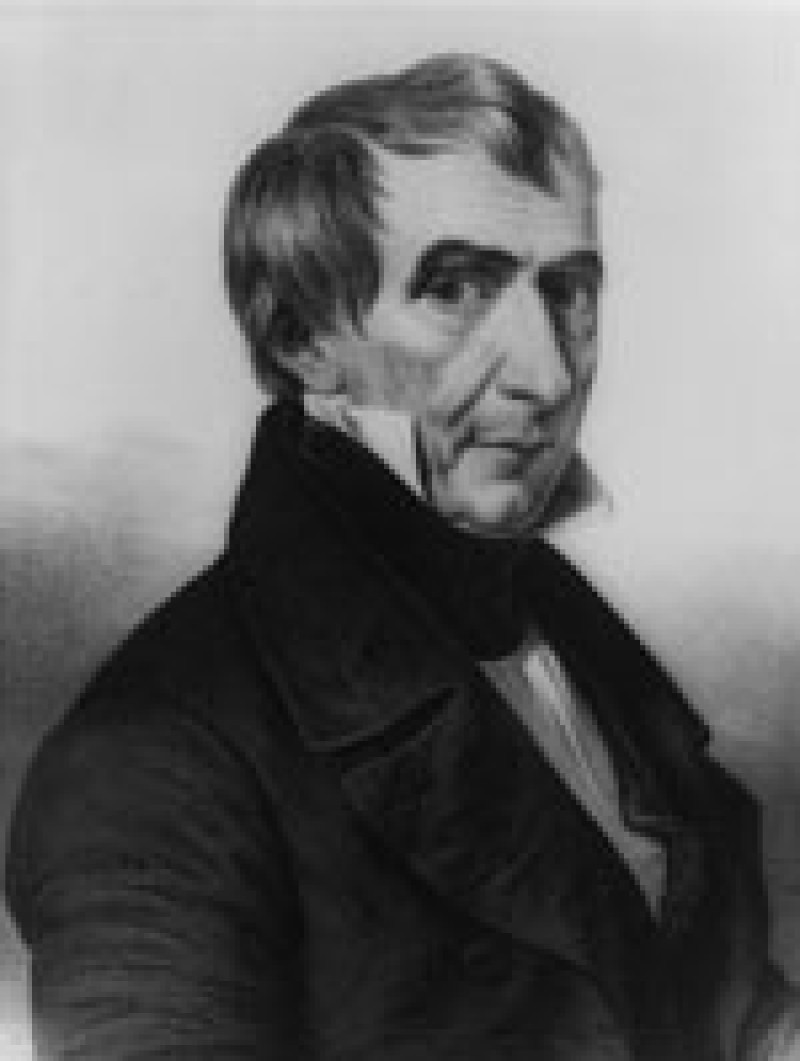William Henry Harrison (Feb. 9, 1773 - April 4, 1841)
William Henry Harrison, ninth president of the United States, was born at Berkeley, his family's plantation on the James River in Virginia. He was also fabulously wealthy, so his father's economic, social, and political legacy stood young William Henry — the youngest of seven children — in good stead.
William may have been sent to a grammar school near Berkeley in his childhood; he certainly attended Hampden-Sidney College beginning in 1787, though he departed without graduating. When word of his father's death arrived, William Henry left Philadelphia with a commission in the U.S. Infantry.
Harrison was posted to the Old Northwest, where tensions with the American Indians ran high and the British had not yielded the forts they were obliged to surrender under the Treaty of Paris. Harrison received a lieutenancy and in 1792 served temporarily as a company commander — a position normally allocated to a captain. Finding garrison duty tedious, Harrison resigned from the army effective June 1, 1798.
On Oct. 3, 1799, the territory's first legislature elected Harrison to be its delegate to the U.S. Congress by a vote of 11-10. While in Congress, Harrison was made chairman of a committee for the revision of the public lands laws. This committee reported the Land Act of 1800, which facilitated the sale of public lands in the Northwest Territory.
The War of 1812 gave Harrison a way out of a deteriorating personal political situation. He thought the British were behind the uprising of the Shawnee leader Tecumseh and his brother, the "prophet" Tenskwatawa. Tecumseh's attempt to intimidate Harrison into conceding the justice of the American Indians' claims failed, and a series of murders and raids by the Shawnees heightened tensions.
President James Madison later made Harrison commander of the army for the northwestern United States and charged him with retaking Detroit and invading Upper Canada.
In 1813 Harrison's plan to invade Canada was preempted by the second British invasion of Ohio. Commodore Oliver Hazard Perry's victory over the British fleet on Lake Erie made the British position in Michigan untenable, and Harrison retook Detroit on Sept. 29.
From 1816 to 1828 Harrison served in Congress and in the Ohio Senate. As a senator in Ohio from 1819 to 1821, Harrison--who had once been a director of the Cincinnati branch of the United States Bank--took a firmly anti-bank tack, saying he had always been opposed to all banks. Yet, his position on slavery extension offended his constituents, and not only did he fail in races for the U.S. Senate in 1821 and for governor in 1820 (receiving no votes in his own county), but his district declined to re-elect him.
In the 1824 presidential campaign Harrison worked for Clay in Ohio. Clay won Ohio's electoral votes, and in 1825 the legislature chose Harrison to be U.S. senator from Ohio. Although he was chairman of the Committee on Military Affairs, his three-year service in the Senate was undistinguished. In 1828 he failed to attain nomination as President John Quincy Adams' running mate and he then accepted appointment as ambassador to Colombia.
The period between Harrison's return to the United States in 1830 and his election to the presidency in 1840 was a fallow one. In the 1836 presidential season, Harrison was put forward by politicians in a few northern states, and he drew 73 electoral votes — a very good showing for a sectional candidate. It was a Whig election cycle, and virtually anyone nominated as a Whig would probably have defeated Martin Van Buren. Harrison did so, 234 electoral votes to 60.
Harrison served as president for one month, during which he did call Congress into special session to enact the Whigs' active government program. Before that could happen, Harrison died of pneumonia in Washington, D.C.
William Henry Harrison's significance is not great. His tenure as president was truncated, and his career in federal political office was a relatively undistinguished one. As for his military career, one can safely say that his record in that field was less incompetent than those of most of the major military and civilian leaders.
Some content and graphic elements featured on webpages related to the Thomas J. Moyer Ohio Judicial Center were used with the permission of the Ohio Historical Society; the Prints and Photographs Division of the Library of Congress; the Office of the Curator of the Supreme Court of the United States and American National Biography Online.
Biography of William Henry Harrison (Feb. 9, 1773 - April 4, 1841)
Citation: K.R. Constantine Gutzman. "Harrison, William Henry"; http://www.anb.org/articles/03/03-00211.html; American National Biography Online Feb. 2000. Access Date: Fri Dec 5 08:39:16 2003. Copyright © 2000 American Council of Learned Societies. Published by Oxford University Press. All Rights Reserved.
Portrait of William H. Harrison - Library of Congress, Prints & Photographs Division.

